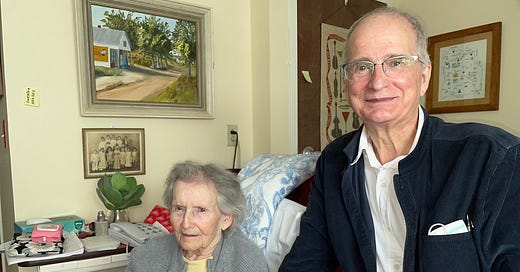Preparing for Sharp's Essay in Yee's Book
John Sandercock | Year 3 participant, St. Bartholomew's, New York City
John Sandercock is in Year 3 of EfM at St. Bartholomew’s Church in New York City, and a member of the Church of the Holy Apostles on the west side of Manhattan. He works as a lawyer. This short introduction is intended to summarize Carolyn Sharp’s essay on the Pentateuch in language familiar to lay readers. When his EfM seminar read the essay two years ago, they found the academic language frustrating, and it kept them from engaging with the topic as fully as they thought it deserved. He wrote this introduction for the Year Ones who follow, hoping they find it helpful.
The question posed toward the end and the responses following it reflect one reader’s partial response to the essay, and are offered merely as a suggestion for discussion.
In order to understand Sharp’s essay, the reader needs to know that “hermeneutics” is the theory and methodology of interpretation, especially the interpretation of biblical texts, wisdom literature, and philosophical texts.
In this essay, Sharp is examining the Pentateuch, using her own specific feminist hermeneutics (p. 44), the goals of which include:
Honoring all subjects, because the lived experience of all beings, including nonhuman creatures, should be honored;
Interrogating relations of power, because all relationships involve power; and power should be used to promote justice, reconciliation, and the flourishing of all beings; and
Reforming communities, because communities always stand in need of reform.
As Sharp describes it, feminist biblical criticism seeks to show the ways in which authoritative sacred texts and their interpretation have lifted up some subjects while marginalizing others.
Sharp chooses not to give her own opinion of these ancient Biblical texts. Instead, she describes what the hypothetical “contemporary feminist hermeneut” (p. 59) might make of them. A “hermeneut” is a person who studies texts and attempts to interpret them; Sharp herself is thus a “contemporary feminist hermeneut”. Feminist interpreters do not need to be women, however.
Sharp notes that scribes, who were predominantly male, enjoyed considerable power in the ancient Near East, and that these texts are cultural performances of that power (p. 43). For these reasons, it is important to inquire into the “gendered perspectives” of ancient scribes.
She concludes that these texts have glorified certain ways of thinking about agency and power while dishonoring and harming subjects who inhabit agency and power in other ways (p. 44). The ongoing interrogation of power relations is crucial to feminist work (p. 44).
Like all forms of biblical criticism, this one illuminates some aspects of the Bible more than others. Therefore, it is only one of several forms of criticism that we should consider. (Collins’ historical-critical approach is another.)
Question: if God is imagined as an all-powerful male in the Pentateuch, and we [along with Sharp] think that is wrong, why does the Pentateuch retain any authority today?
Because it retains value as a guide for building community.
Because we may find that some statements retain their truth even after the apparent bias of the speaker is recognized.
Because we may find that some statements are true in the context in which they are expressed, even if they have to be modified to fit other contexts, for example, because the way power is applied does not promote justice or the flourishing of all beings.
Because it raises important questions, and feminist criticism (among other theories of criticism) may be able to show us how the answers it supplies should be modified to make them relevant today.




